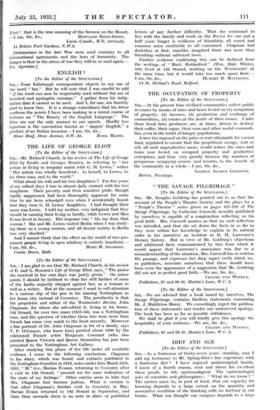THE LIFE OF GEORGE ELIOT
[To the Editor of the SPECTATOR.] SIR,—Mr. Richard Church, in his review of The Life of George Eliot by Emilie and Georges Romieu, in referring to "her action in living in irregular union with G. H. Lewes," writes "Her action was wholly beneficial ; to herself, to Lewes, to his three sons, and to the world."
What about his wife and his two daughters ? For five years of my school days I was in almost daily contact with his two daughters. Their poverty and their sensitive pride, though rigidly suppressed, had been thoroughly apparent for some time to my keen schoolgirl eyes when I accidentally learnt that they were G. H. Lewes' daughters. I had thought their name was Lewis. I told my mother, very indignant that they should be earning their living so hardly, while Lewes and Miss Evans lived in luxury. Her response was " Ah, my dear, that woman ! She and Mr. Lewes visited Berlin when I was study- ing there as a young woman, and all decent society in Berlin was very shocked."
And I cannot think that the effect on the world of two pro- minent people living in open adultery is entirely beneficial.—














































 Previous page
Previous page